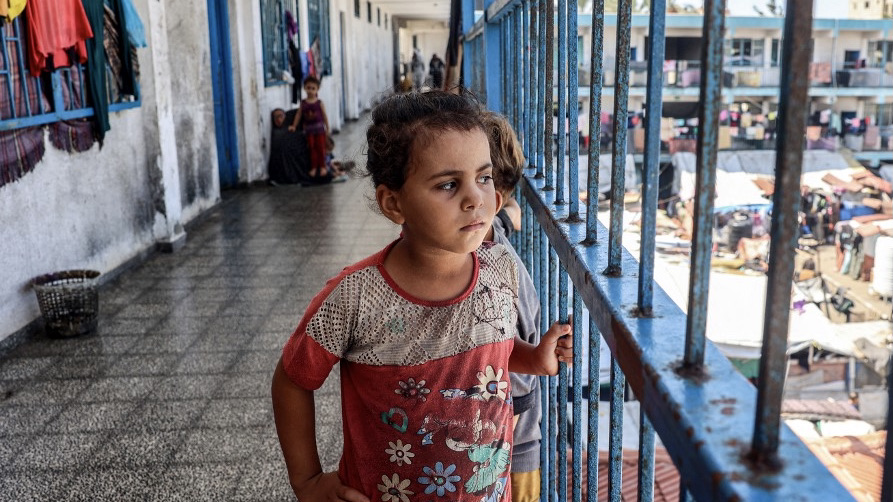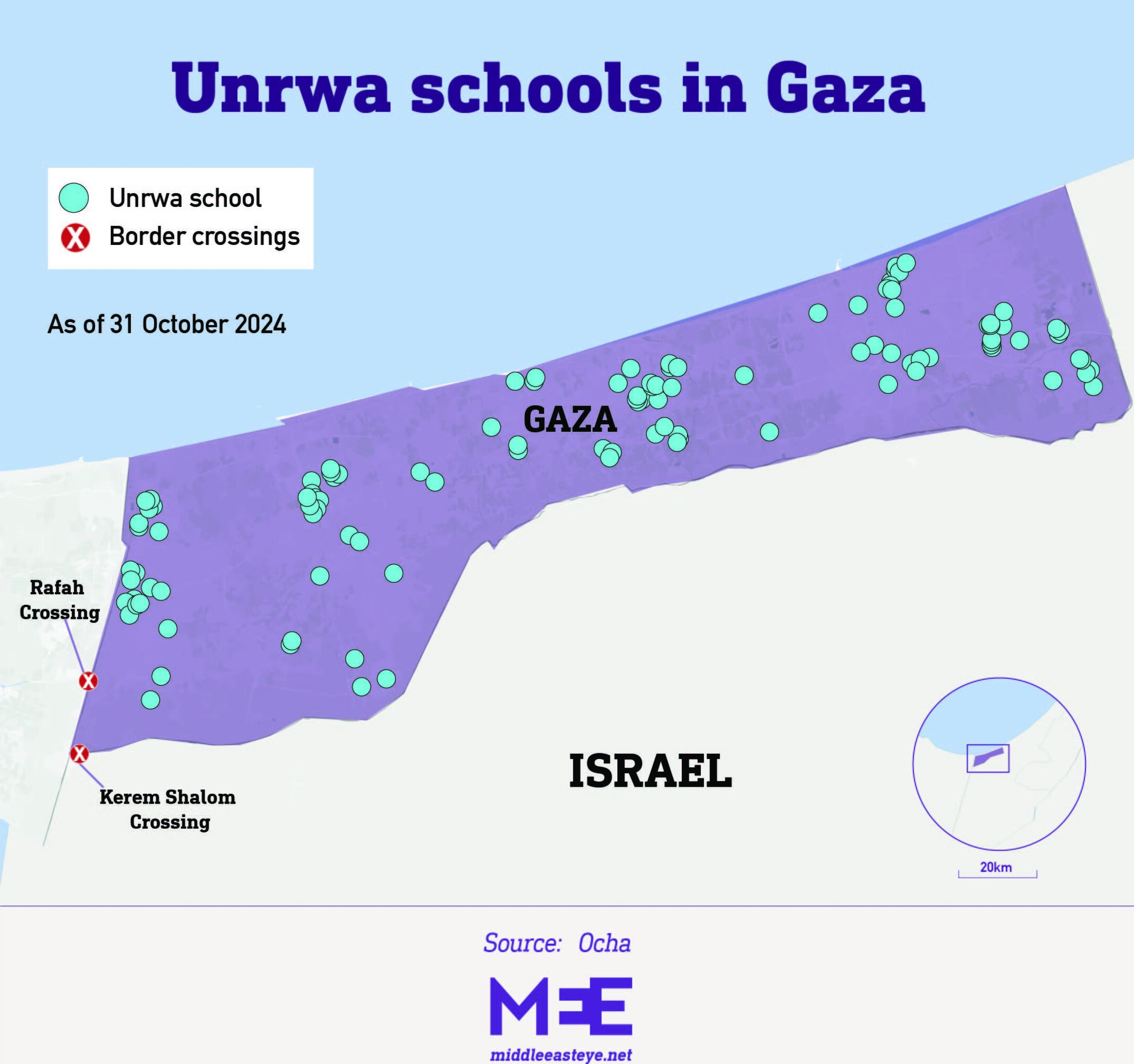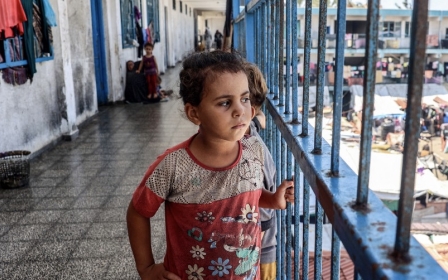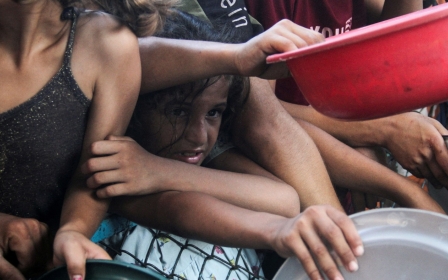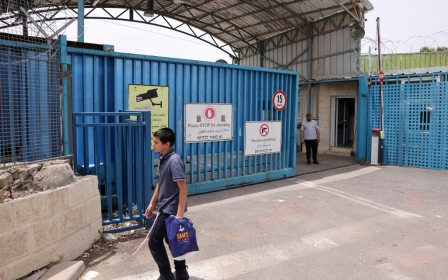Israel Unrwa ban: How Palestine's health, education and food services could collapse

Before the war, Gaza was dotted with bright blue buildings, daubed with colourful murals. Today, these Unrwa schools are either sheltering displaced families or reduced to rubble.
Louise Wateridge, a spokesperson for Unrwa, the United Nations agency for Palestinian refugees, first went to Gaza five years ago.
She was struck by how pervasive Unrwa's presence was, marked by the vibrantly painted schools bringing flashes of colour to Gaza's streets.
“Unrwa is just everywhere,” Wateridge told Middle East Eye. “Going back to before the war, if you went to Gaza you would see their schools have these beautiful murals.
“That’s how we recognise them when they’re bombed, they’ve got this beautiful blue colouring.”
New MEE newsletter: Jerusalem Dispatch
Sign up to get the latest insights and analysis on Israel-Palestine, alongside Turkey Unpacked and other MEE newsletters
Gaza was awash with the Unrwa blue. Even the agency's food distribution and flour packages are all branded with the same shade.
"You can't really go more than a few streets without seeing something Unrwa is doing in the Gaza Strip," Wateridge said.
On Monday, Israel's parliament, the Knesset, voted to declare the agency a “terror” group, banning it from operating in Israel, including occupied East Jerusalem, and severely curtailing its ability to deliver aid and services in Gaza and the occupied West Bank.
The legislation, which will come into force in 90 days, will prevent the Israeli authorities from issuing entrance permits to the agency staff, remove their legal immunity within Israel and force Unrwa's headquarters in East Jerusalem to close.
It will also ban cooperation between the Israeli military and Unrwa, on which the agency has been dependent to deliver aid to Gaza. Israel controls all the crossings into the Palestinian enclave.
'The quality of life will deteriorate to medieval levels if this goes ahead'
– Charles Lawley, Action for Humanity
Similarly, in the West Bank, where refugee camps are wholly dependent on Unrwa services, the Israeli military’s control of the territory’s borders will make it impossible for the agency to operate.
“All the borders of Palestine have to go through Israel, which means that any visitor that has any relation to Unrwa or any employee will have to come through Israeli crossing points,” Sleman Zohery, resident and political figure in the Nur Shams refugee camp in the West Bank, told MEE.
Israel's ban revokes a 1967 treaty allowing the agency to operate in Israeli-controlled areas, and violates the UN charter - and therefore international law.
Unrwa chief Philippe Lazzarini warned that the law will make the implementation of its UN mandate to support Palestinian refugees “impossible”.
“I think the entire aid ecosystem in Gaza will collapse,” said aid group Action for Humanity's Charles Lawley.
“The quality of life will deteriorate to medieval levels if this goes ahead,” he said.
The ban has also raised fears that this may be the first step towards Israel trying to strip Palestinian refugees of their refugee status.
Many Palestinians believe Israel is targeting Unrwa as a way to undermine Palestinian refugees' right to return to their former homes across Israel and occupied Palestine, a right enshrined by United Nations General Assembly Resolution 194.
“The refugee camps are the last witness of the horrific events of the Nakba," Zohery said, referring to the forced expulsion of 750,000 Palestinians from their homelands when Israel was created in 1948.
"Israel has been working for a long time to finish the issue of the refugee camps and transfer their residents,” he told MEE.
‘No one will be able to replace them’
Unrwa is the leading UN agency operating on the ground in the West Bank and Gaza Strip, handling almost all the UN aid distribution in the enclave.
The agency serves around 5.9 million people in Palestine and neighbouring countries Jordan, Syria and Lebanon, mostly in refugee camps.
Much of Gaza’s 2.2 million population is dependent on its aid and services, including food, shelter, healthcare and education. Smaller NGOs rely on its aid distribution to do their work.
“Because Unrwa has been such a huge player in the Gaza Strip and such a huge humanitarian responder for so many years, there are Unrwa systems and staff in place,” Wateridge said.
“It's our colleagues that are collecting the aid, that have the systems in place, food distribution centres and warehouses and sites to use."
Gaza is facing a spiralling humanitarian crisis amid intensifying Israeli attacks and restricted humanitarian aid access, particularly since Israel seized Gaza's Rafah crossing with Egypt in May.
According to the UN's OCHA, only 552 aid trucks were allowed to enter the strip through the Kerem Shalom crossing between 1-20 October 2024, representing almost the lowest daily average since October 2023, when Israel's war on Gaza began.
"Aid has just decreased so rapidly and so visibly since the Rafah crossing closed," said Wateridge, who was in the southern Gaza city when the crossing was seized and sealed off by Israel.
"It's just been so desperate on a weekly basis, getting worse and worse."
Ziad Issa, head of policy and research at Action Aid, which operates in Gaza, told MEE many NGOs operating in Gaza have been using Unrwa warehouses, distribution centres and health centres.
According to Issa, Unrwa is also the main organisation responsible for distributing fuel to aid workers there.
“They provide fuel to hospitals, to other UN agencies, to other NGOs," Issa told MEE. “This will go towards running the trucks that we use to distribute aid supplies.”
He also said that because of Unrwa's "capacity, their sources, the facilities, the institutional knowledge, the historical knowledge that they have in Gaza, and similarly the West Bank, no one will be able to replace them”.
Healthcare and social services
Unrwa is the largest health provider in Gaza, with over half the population relying on the agency for essential healthcare services, including for the treatment of chronic diseases, maternal and child health, and vaccinations.
Unrwa’s health teams provide over 15,000 consultations in the enclave each day.
Medical aid groups, which work closely with the agency to deliver healthcare services in Gaza and the West Bank, have warned that the Israeli ban could push Gaza’s already largely destroyed health system to collapse.
“We work with Unrwa in Gaza because they refer quite a lot of people to us for our specialised services, like burns and trauma care,” Medecins Sans Frontieres (MSF) spokesperson Amber Alayyan told MEE.
“Unrwa is one of the gatekeepers of the population’s health... they’re the first port of call for patients.”
'We've had medical teams going door to door, reaching children, and none of that would have been possible without Unrwa staff on the ground'
- Louise Wateridge, Unrwa
The agency has also played a critical role in delivering preventive care, with routine immunisation in Gaza standing at 99 percent in 2022. This dropped to less than 90 percent following the start of Israel’s war on Gaza.
“What we’re seeing in Gaza is the deterioration of the health status of the population, because it’s a population that used to get vaccinations regularly, then you see your first cases of polio because that’s been disrupted,” Alayyan said.
Following the outbreak of polio in Gaza in July, Unrwa worked with partners such as Unicef, the UN agency for children, and the World Health Organization, to vaccinate at least 90 percent of the territory’s children.
“Unicef and the World Health Organization coordinated the vaccines, and Unrwa colleagues were on the front line distributing them,” Wateridge told MEE.
“We've had medical teams going door to door, reaching children, and none of that would have been possible without Unrwa staff on the ground.”
Sanitation, which is also instrumental in curbing the spread of disease, is one of Unrwa’s largest services.
“Our sanitation workers, especially in the Gaza Strip, they're really frontline staff trying to clear drains, remove trash and stop the spread of disease,” Wateridge said.
In the West Bank, the relief agency provides maternal and children’s healthcare, immunisations and mental health services.
“Unrwa is the primary caregiver in the West Bank,” Alayyan told MEE, adding that the ban would prove “catastrophic”.
“Israel has a military occupation of the West Bank and Gaza… they don't do any social services. They've never done that. And so what you have is a network of civil society and organisations,” Alayyan said.
“When you start pulling away at that fabric, it brings down the whole society.”
Famine threatens entire population
Unrwa is the main supplier of food aid in Gaza, providing emergency assistance to over one million people across the territory.
The UN-backed Integrated Food Security Phase Classification (IPC) revealed this month that the entire population of the territory remains at risk of famine and is currently experiencing an "emergency" level of acute food insecurity.
The monitoring body expects people in northern Gaza - where barely any aid has entered since 1 October, amid a massive ground operation launched by the Israeli military - to face even more severe food insecurity.
'If you occupy the territory, the people in it are your responsibility. And Israel has been refusing or failing to provide that'
– Bill van Esveld, Human Rights Watch
“Speaking to colleagues today in Gaza, people are very fearful of what this means," Wateridge said. "It just comes at a time where every day we think it's not going to get any worse, and then a ruling like this has come through, and you just can't see a way out.”
“We really cannot see a way out, or any hope or any kind of light at the end of the tunnel.”
According to Alayyan, before the war Palestinians in Gaza did not suffer greatly from malnutrition, despite the crippling blockade Israel enforced, because Unrwa carried out screenings and provided treatment when necessary.
“They had chronic micronutrient deficiencies because of the siege, but not global malnutrition that you see in other resource-deprived contexts,” she said. “And a large reason for this is Unrwa."
Meanwhile, in the West Bank, the agency’s Relief and Social Services (RSS) programme provides basic food supplies and cash subsidies and emergency cash grants to over 23,000 people.
Education and employment
Unrwa is also a key provider of education in the West Bank and Gaza, reaching over 294,000 students in Gaza and over 46,000 in the West Bank.
Agency chief Lazzarini warned that the impending ban would deprive over 650,000 girls and boys from education, "putting at risk an entire generation of children”.
In the West Bank and East Jerusalem, Unrwa provides primary education, running 96 schools and two vocational training centres.
“If it wasn’t for them, these kids would have no access to education, because the Palestinian Authority does not have the resources to do it,” Bill van Esveld, acting Israel-Palestine director at Human Rights Watch, told MEE.
As the biggest employer in Gaza, where it has over 13,000 staff, Unrwa’s ban will also threaten livelihoods across Palestine, and remove opportunities for young people.
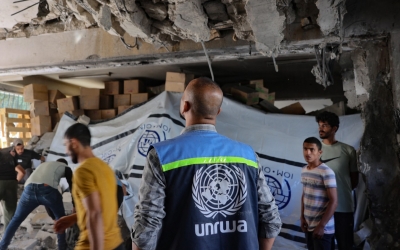
“Where are people going to get employment from one year into war? There’s already a huge cash deficit,” Wateridge said.
The agency also worked to provide job creation programmes to mitigate unemployment, which in Gaza is among the highest in the world.
“The Gaza Strip has an incredibly young population, and a lot of people were looking to get work through education,” Wateridge added.
“People in Gaza see education as their ticket out of the blockade.”
Under international law, Israel as an occupying power is obligated to ensure humanitarian aid and goods necessary for the survival of the Palestinian population.
This was reiterated by an International Court of Justice (ICJ) ruling on 19 July that stated that "Israel is obligated to administer the occupied territory in a manner that benefits the local population".
"International law is very clear that if you occupy the territory, the people in it are your responsibility. And Israel has been refusing or failing to provide that," Van Esveld told MEE. "In a way, they've gotten away with it cost free."
"So what's their plan? To now step up to their international responsibilities?" he added. "Who do they think is responsible?"
Middle East Eye delivers independent and unrivalled coverage and analysis of the Middle East, North Africa and beyond. To learn more about republishing this content and the associated fees, please fill out this form. More about MEE can be found here.


